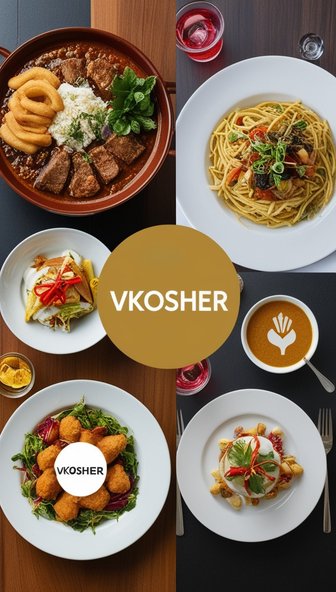Understanding a Kosher Kitchen: A Comprehensive Guide
A kosher kitchen is a space designed to adhere to Jewish dietary laws, known as kashrut, which govern the preparation and consumption of food according to religious guidelines. These laws originate from the Torah and are elaborated in various Jewish texts and rabbinical interpretations. The primary goal of a kosher kitchen is to ensure that all food prepared and consumed meets the strict requirements set forth by these dietary laws, creating an environment of spiritual mindfulness and adherence to tradition.
The Foundations of Kashrut
To understand what constitutes a kosher kitchen, it is essential first to grasp the principles of kashrut. Kashrut outlines which foods are permitted and prohibited, how they should be prepared, and how they must be consumed. The laws are detailed and complex, encompassing everything from the types of animals that can be eaten to the separation of meat and dairy products.
One of the most fundamental aspects of kashrut is the prohibition of certain animals. For instance, kosher dietary laws forbid the consumption of pork and shellfish, as these are considered non-kosher. Additionally, kosher meat must come from animals that chew cud and have split hooves, such as cows and sheep. The slaughtering process must also adhere to specific methods to ensure the meat is prepared in a manner deemed humane and hygienic.
Separating Meat and Dairy
One of the most noticeable features of a kosher kitchen is the strict separation of meat and dairy products. This separation is rooted in the biblical commandment to "not boil a kid in its mother’s milk." As a result, kosher kitchens typically have separate sets of utensils, cookware, and even dishes for meat and dairy products. This separation extends to different cooking surfaces and storage areas to prevent any cross-contamination.
In a kosher kitchen, it is common to find two distinct areas: one designated for meat and one for dairy. These areas are equipped with their respective utensils and appliances, such as cutting boards, pots, and pans. Special care is taken to ensure that these items do not come into contact with each other. Additionally, many kosher kitchens include separate sinks for meat and dairy to avoid any accidental mixing.
Koshering Utensils and Appliances
Maintaining the kosher status of utensils and appliances is another crucial aspect of a kosher kitchen. When a kitchen utensil or appliance is used for meat or dairy, it must be "koshered" before it can be used for the opposite type of food. Koshering is a process of purification that involves cleaning and, in some cases, heating items to a specific temperature to remove any residual food particles.
For instance, pots and pans that have been used for meat must be thoroughly cleaned and then heated to a high temperature to be considered kosher for dairy use. This process can vary depending on the material of the utensil and the specific practices of different Jewish communities. Some items may require special treatment, such as immersion in boiling water or exposure to intense heat.
The Role of a Kosher Certification
Kosher certification is a vital component of maintaining a kosher kitchen. Products and ingredients used in a kosher kitchen must bear a reliable kosher certification symbol, indicating that they meet the necessary standards. These symbols are provided by various kosher certification agencies, which oversee and verify that food products comply with kosher regulations.
In addition to packaged foods, kosher certification can also apply to fresh produce and other raw ingredients. The certification process involves inspecting production methods, ingredients, and the facilities where the food is processed. This ensures that all aspects of the food production adhere to kosher standards and that no non-kosher substances are present.
Kosher Kitchen Design and Organization
Designing and organizing a kosher kitchen involves careful planning to ensure that all aspects of kashrut are observed. A well-designed kosher kitchen not only separates meat and dairy but also integrates practical features to streamline food preparation and maintain cleanliness.
Counter space is often divided into areas designated for meat and dairy use, with clear labeling to prevent confusion. Storage solutions, such as separate cabinets or pantry sections, are used to keep meat and dairy products apart. Additionally, appliances such as refrigerators and dishwashers may be configured to accommodate the separation of these food categories.
Cleaning and Maintenance
Maintaining a kosher kitchen requires diligent cleaning and maintenance to ensure compliance with dietary laws. Regular cleaning of surfaces, utensils, and appliances is essential to prevent any accidental mixing of meat and dairy residues. Special attention is given to areas where food preparation occurs, such as countertops and sinks.
In addition to routine cleaning, a kosher kitchen may require periodic koshering of utensils and appliances. This process ensures that any residual food particles are removed and that the kitchen remains in accordance with kashrut standards. Proper training and adherence to cleaning protocols are crucial for maintaining the integrity of a kosher kitchen.
Educational Resources and Community Support
For individuals new to maintaining a kosher kitchen, various educational resources and community support systems are available. Many Jewish communities offer classes, workshops, and online resources to help individuals learn about kashrut and how to implement it effectively in their kitchens. These resources provide practical tips, guidance on kosher certification, and advice on managing a kosher kitchen.
Community support can also play a significant role in helping individuals navigate the complexities of kashrut. Local synagogues, kosher food stores, and rabbinical authorities often provide valuable assistance and answer questions related to kosher practices. Engaging with these resources can offer additional insights and support for maintaining a kosher kitchen.
Conclusion
A kosher kitchen represents a commitment to adhering to Jewish dietary laws and maintaining a space that honors tradition and spiritual practice. By understanding the principles of kashrut, implementing proper separation of meat and dairy, and ensuring the kosher status of utensils and appliances, individuals can create a kitchen environment that aligns with religious guidelines. The careful design, organization, and maintenance of a kosher kitchen reflect a dedication to upholding these important dietary laws, enriching the experience of preparing and consuming food within the framework of Jewish tradition.
A kosher kitchen is a space designed to adhere to Jewish dietary laws, known as kashrut, which govern the preparation and consumption of food according to religious guidelines. These laws originate from the Torah and are elaborated in various Jewish texts and rabbinical interpretations. The primary goal of a kosher kitchen is to ensure that all food prepared and consumed meets the strict requirements set forth by these dietary laws, creating an environment of spiritual mindfulness and adherence to tradition.
The Foundations of Kashrut
To understand what constitutes a kosher kitchen, it is essential first to grasp the principles of kashrut. Kashrut outlines which foods are permitted and prohibited, how they should be prepared, and how they must be consumed. The laws are detailed and complex, encompassing everything from the types of animals that can be eaten to the separation of meat and dairy products.
One of the most fundamental aspects of kashrut is the prohibition of certain animals. For instance, kosher dietary laws forbid the consumption of pork and shellfish, as these are considered non-kosher. Additionally, kosher meat must come from animals that chew cud and have split hooves, such as cows and sheep. The slaughtering process must also adhere to specific methods to ensure the meat is prepared in a manner deemed humane and hygienic.
Separating Meat and Dairy
One of the most noticeable features of a kosher kitchen is the strict separation of meat and dairy products. This separation is rooted in the biblical commandment to "not boil a kid in its mother’s milk." As a result, kosher kitchens typically have separate sets of utensils, cookware, and even dishes for meat and dairy products. This separation extends to different cooking surfaces and storage areas to prevent any cross-contamination.
In a kosher kitchen, it is common to find two distinct areas: one designated for meat and one for dairy. These areas are equipped with their respective utensils and appliances, such as cutting boards, pots, and pans. Special care is taken to ensure that these items do not come into contact with each other. Additionally, many kosher kitchens include separate sinks for meat and dairy to avoid any accidental mixing.
Koshering Utensils and Appliances
Maintaining the kosher status of utensils and appliances is another crucial aspect of a kosher kitchen. When a kitchen utensil or appliance is used for meat or dairy, it must be "koshered" before it can be used for the opposite type of food. Koshering is a process of purification that involves cleaning and, in some cases, heating items to a specific temperature to remove any residual food particles.
For instance, pots and pans that have been used for meat must be thoroughly cleaned and then heated to a high temperature to be considered kosher for dairy use. This process can vary depending on the material of the utensil and the specific practices of different Jewish communities. Some items may require special treatment, such as immersion in boiling water or exposure to intense heat.
The Role of a Kosher Certification
Kosher certification is a vital component of maintaining a kosher kitchen. Products and ingredients used in a kosher kitchen must bear a reliable kosher certification symbol, indicating that they meet the necessary standards. These symbols are provided by various kosher certification agencies, which oversee and verify that food products comply with kosher regulations.
In addition to packaged foods, kosher certification can also apply to fresh produce and other raw ingredients. The certification process involves inspecting production methods, ingredients, and the facilities where the food is processed. This ensures that all aspects of the food production adhere to kosher standards and that no non-kosher substances are present.
Kosher Kitchen Design and Organization
Designing and organizing a kosher kitchen involves careful planning to ensure that all aspects of kashrut are observed. A well-designed kosher kitchen not only separates meat and dairy but also integrates practical features to streamline food preparation and maintain cleanliness.
Counter space is often divided into areas designated for meat and dairy use, with clear labeling to prevent confusion. Storage solutions, such as separate cabinets or pantry sections, are used to keep meat and dairy products apart. Additionally, appliances such as refrigerators and dishwashers may be configured to accommodate the separation of these food categories.
Cleaning and Maintenance
Maintaining a kosher kitchen requires diligent cleaning and maintenance to ensure compliance with dietary laws. Regular cleaning of surfaces, utensils, and appliances is essential to prevent any accidental mixing of meat and dairy residues. Special attention is given to areas where food preparation occurs, such as countertops and sinks.
In addition to routine cleaning, a kosher kitchen may require periodic koshering of utensils and appliances. This process ensures that any residual food particles are removed and that the kitchen remains in accordance with kashrut standards. Proper training and adherence to cleaning protocols are crucial for maintaining the integrity of a kosher kitchen.
Educational Resources and Community Support
For individuals new to maintaining a kosher kitchen, various educational resources and community support systems are available. Many Jewish communities offer classes, workshops, and online resources to help individuals learn about kashrut and how to implement it effectively in their kitchens. These resources provide practical tips, guidance on kosher certification, and advice on managing a kosher kitchen.
Community support can also play a significant role in helping individuals navigate the complexities of kashrut. Local synagogues, kosher food stores, and rabbinical authorities often provide valuable assistance and answer questions related to kosher practices. Engaging with these resources can offer additional insights and support for maintaining a kosher kitchen.
Conclusion
A kosher kitchen represents a commitment to adhering to Jewish dietary laws and maintaining a space that honors tradition and spiritual practice. By understanding the principles of kashrut, implementing proper separation of meat and dairy, and ensuring the kosher status of utensils and appliances, individuals can create a kitchen environment that aligns with religious guidelines. The careful design, organization, and maintenance of a kosher kitchen reflect a dedication to upholding these important dietary laws, enriching the experience of preparing and consuming food within the framework of Jewish tradition.




